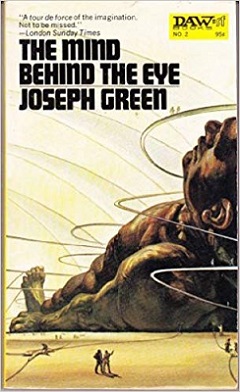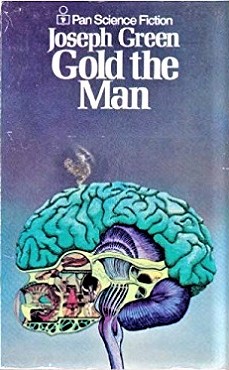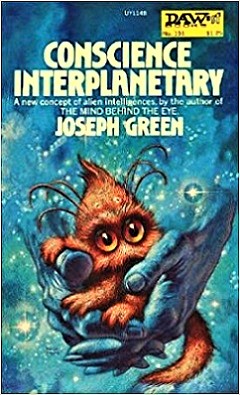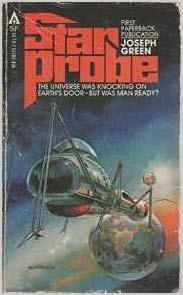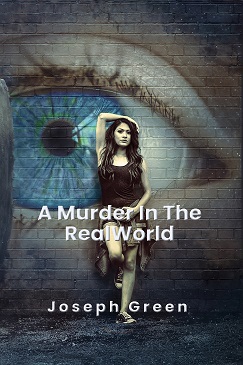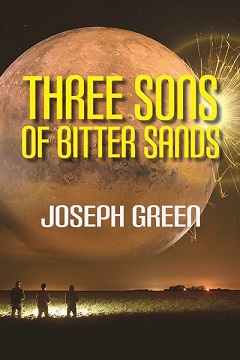Tangent Online Presents:
An Interview with Joseph Green
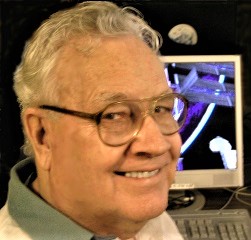
(1931- )
(Interview conducted by email April 29-May 1, 2019)
Interviewer Dave Truesdale
Introduction
Joseph Green may not be a household name to newer generations of SF readers, but let it be known that to many of us who have been involved in the field for decades his name is more than a familiar one, as he has given us fond memories through his short stories, novels, and other behind the scenes contributions to the field.
Joe Green sold his first short story to New Worlds SF (“The Engineer,” February 1962), and saw his first novel published in 1965 (The Loafers of Refuge, Ballantine). Writing steadily through the 1960s into the 1980s, he confined himself to occasional short works for the rest of the century, telling friends that his job had become so demanding it did not allow time for novels. He resumed writing at book length as well as short stories after retiring.
What brought us together for this interview was our love for the work of the late SF author couple Leigh Brackett and Edmond Hamilton. After reading our interview of the pair recently, Joe recalled a meeting he had with them while working at NASA in the late 1960s, and thought we’d like to hear the story. Along with this fascinating recollection (where numerous other SF luminaries are also mentioned), Joe also talks about his new work, and his thoughts on the disturbing turn traditional publishers have taken with their contracts, gobbling up more rights authors once routinely reserved for themselves, and how Indy publishing may be the way to go for both new and established authors in today’s radically altered publishing climate.
Below is a brief biography Joe was kind enough to put together for those not familiar with him or his work. I thank him for this and also the time he took to do this delightful and informative interview, and hope you enjoy it as much as I have.
Joseph Green biography
Joseph Green followed a duel career, working for 37 years in the American space program (six military, 31 civilian), and freelance writing at night and on weekends. He retired from NASA as Deputy Chief of the Education Office at the Kennedy Space Center. At KSC he specialized in preparing fact sheets, brochures and other semi-technical publications for the general public, explaining complex scientific and engineering projects in terms understandable to a layman. He also prepared over 20 science papers for NASA and contractor executives. As a part-time writer he produced five novels and about 90 short works, the latter published primarily in the magazines Analog and Fantasy & Science Fiction, and in original anthologies. More current works can be found on the “Joseph Green” page at Amazon Books. Prior jobs include working as a mill hand, construction worker, and shop supervisor for Boeing, the last while building Bomarc and Minuteman missile bases around the USA. B.A., University of Alabama.
TANGENT: Welcome back, Joe. I understand you got in touch because you only recently read the Brackett/Hamilton interview we did decades ago—their last joint one—and saw that Ed Hamilton mentioned attending the launch of Apollo 12 in 1969, our second moon landing.
JOSEPH GREEN: Yes, that rang bells for me because I so much enjoyed having Leigh and Ed as house guests for three days prior to the launch. I thought you might want to know a little more than the bare mention in your interview. I had invited them to see the launch, and arranged for the press credentials he mentioned. (The Press Site at KSC is closer to the launch pad than even most VIPs get!) My then-wife Juanita and I gave them our bedroom (with private bath) while here, and moved into a guest room. Ed was ill, and needed the privacy. They attended the pre-launch party we threw the night before every Apollo Mission to the moon. I was a great admirer of both writers. I talked about that visit in an article published in the November 2009 issue of The New York Review of Science Fiction.
TANGENT: You say you and Juanita threw a pre-launch party for every Apollo moon landing mission?
GREEN: Yes, that was our major contribution to the science fiction community. I also helped the writers we invited get press credentials. NASA doesn’t recognize free-lance writers, not even the giants. (Heinlein had to attend Apollo 11, the first Moon landing, as an honored guest of Rockwell, and Arthur Clarke as a commentator working on CBS TV with Walter Cronkite.) NASA always provided the press with two days of prior tours and educational briefings, which were highly worthwhile. Escorting people to and from these briefings was one of my major assignments at KSC.
TANGENT: So you were working at your regular job while your house was filled with guests? What inspired you and Juanita to put on what seems a mini-convention all by yourselves?
GREEN: Yes, I always had to work, ten hours a day or more. So did Juanita. Between that and looking after our guests, I averaged maybe three hours sleep a night for those three days. What inspired me? It was when I realized I was the only member of the SF community working at the space center. I decided to support what Heinlein and others considered the most momentous event of the century, the landing of humans on another terrestrial body, by helping fellow writers deeply interested in the real space program to see a launch in person. When a Saturn V lifted off, the ground shook and you could hear those five huge rocket engines for thirty miles! Juanita and daughter Rose-Marie were equally enthusiastic about hosting a pre-launch party the night before each launch. We took as many guests as the house would hold for the three days, and arranged for the overflow to go to the same small motel here on Merritt Island (of which the Kennedy Space Center occupies the northern end, with Cape Canaveral to its east). Poul, Karen and Astrid Anderson, along with Gordon Dickson, Sterling Lanier, Hal Clement, Kelly and Polly Freas, Sam and his wife Chris Moskowitz, Joe and Gay Haldeman (they usually slept in a tent outside on the lawn), and Stan Schmidt, were among our most frequent attendees.
TANGENT: Who else attended your parties? Any other famous names?
GREEN: Yes, many, but they all tend to run together now so many years later. Hard to say which writer came to a specific party. I was attending a fair number of Cons at the time, and had met many of them. But the parties gave me the chance to meet a lot of SF writers or editors I admired and had not previously met. I do remember among them were Judy-Lynn Benjamin, Dan Galouye, Richard Meredith, Andy and Jody Offutt, A.E. Van Vogt, Dave and Ruth Kyle, Jay Haldeman, Roger Zelazny, Harry Harrison, and Freff, that I can remember or about whom I have a note somewhere. There were many others I fear I’ve forgotten, or didn’t think at the time to record.
TANGENT: Heinlein and Clarke, but not Asimov?
GREEN: At wife and daughter’s insistence I invited Asimov, but he sent me a card—I still have it somewhere—saying he didn’t fly, which I didn’t know at the time. He also said he didn’t really believe anything like moon landings had occurred until he read about it later in a book. I thought that rather strange.
TANGENT: I’ll bet you weren’t the only one who didn’t know he wouldn’t fly. And that would have been a very long trip by car. OK, let’s move on to what you’re doing now. I see you have some new novels and collections out.
GREEN: Yes, I went into full-time writing after retiring. By full time I mean four hours a day, six days a week. But I learned very quickly that the publishing world had dramatically changed since my last novel was published, in the previous century. Print publishing was in serious decline. Bookstores were closing. Some entire chains went out of business. When I sent out my first new novel after retiring, one editor frankly told my agent, “Don’t send us anything but potential best-sellers.” That left me and most of what were formerly called “mid-list writers” out in the cold. What was worse, almost all the old established publishers would not look at simultaneous submissions, but if you sent in a single submission, they would hold it for a year and then reject it. Life is too short to put up with that.
TANGENT: I’ve heard there have also been a lot of contract changes over the last few years, some of them pretty onerous.
GREEN: That’s also true. Because print runs are much smaller these days, the publishers try to make their profits by demanding all other rights. I haven’t received one of those unacceptable contracts myself, but many colleagues have. Kristine Kathryn Rusch, a former editor of F&SF and a very successful full-time writer, often covers contracts in her weekly blog. Publishers now ask you to essentially sign ALL! rights over to them.
TANGENT: Could you tell us a little more about how that affects writers?
GREEN: I know of at least two successful TV series, Justified and Unforgettable that were based on a single short story, by Elmore Leonard and J. Robert Lennon, respectively. If they had signed such a contract, that would have cost them at least a couple million each, maybe more. (Of course I don’t know what their actual contracts said, but I doubt they gave away those rights.) The very successful movie Arrival was based on a short story by Ted Chiang. The point is that you shouldn’t give away those rights. And you should keep translation, audio, book club, electronic media—whatever. Sometimes these pay as much or more than the original publication. But if the publisher demands it, your choice is give in or no sale. A great many writers are desperate enough to get their novels published that they sign such contracts. At least they did. I think that’s changing now as more writers become aware of the potential rip-offs.
TANGENT: And independent publishing is your way around those bad contracts?
GREEN: Yes, it’s the current big thing for a great many freelancers. You get to keep all your rights, and the royalty rates are much better. For example, a $15 quality paperback published by Amazon will net you a 60% royalty after deducting the print costs, which usually leaves you four or five dollars a copy. A print publisher will pay 10%, or $1.50, for the first maybe 5,000 copies, 12% for the next 5,000, 15% up to 20,000, and so on. Few sales get beyond 10,000, these days; many less than 5,000, so the royalty rate stays low. Amazon pays two or three times that per copy. The downside is that the number of books available is so large, and the competition so fierce, that for most of us it’s hard to sell even 5,000. Most Amazon writers, where I’m confined at the moment but planning on expansion soon, do better with e-books. The production costs are minimal, but of course the books sell for much less per copy. Still, that’s where the money is if you have good sales. And Amazon books are available in pretty much all English-speaking countries, as well as many others. So you have a much larger market, but also many more books being published. Standing out in the crowd is difficult.
TANGENT: And how are you doing, if I may ask?
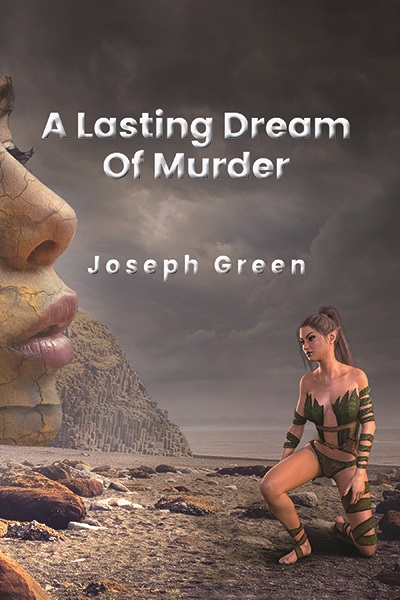 GREEN: Not making much money at the moment, but hoping for improvement. Over the past few years I’ve finished and put up four novels and one reprint collection. Two of the novels, A Murder in the Real-World and A Lasting Dream of Murder, are part of a planned trilogy, of which the third is progressing nicely and will probably be out in 2020. They depict the world of the 2050s, where automation has reduced the work week to the point where everyone has too much leisure time. They spend it living more enjoyable lives in virtual worlds, where the technology has progressed to the point that they seem real. Yaval Noah Harari, in his excellent book Homo Deus: A Brief History of Tomorrow, gets into this as a likely outcome when most of today’s jobs are gone and workers are no longer needed. But I wrote the first two books before a friend showed me Homo Deus.
GREEN: Not making much money at the moment, but hoping for improvement. Over the past few years I’ve finished and put up four novels and one reprint collection. Two of the novels, A Murder in the Real-World and A Lasting Dream of Murder, are part of a planned trilogy, of which the third is progressing nicely and will probably be out in 2020. They depict the world of the 2050s, where automation has reduced the work week to the point where everyone has too much leisure time. They spend it living more enjoyable lives in virtual worlds, where the technology has progressed to the point that they seem real. Yaval Noah Harari, in his excellent book Homo Deus: A Brief History of Tomorrow, gets into this as a likely outcome when most of today’s jobs are gone and workers are no longer needed. But I wrote the first two books before a friend showed me Homo Deus.
TANGENT: Didn’t I see something in a review about ‘a novel within a novel’ in those two?
GREEN: Yes, as a kind of bonus feature I have a major character in each book ‘experience’ a very long virtual world, created from a print novel. The first one is a famous old fantasy, A. Merritt’s The Moon Pool. The second is from the Arabian Nights, one of the longer but less well-known stories, King Omar and His Sons. I seriously condensed both, which required a lot of omitting and rewriting, but the essential stories remain. Both are still book-length, so yes, each is a novel within a novel.
TANGENT: And the other two new novels?
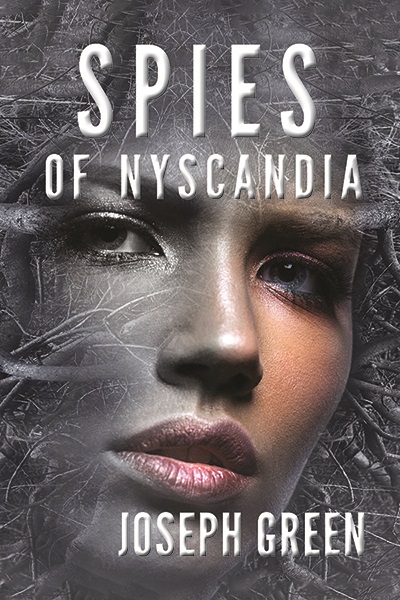 GREEN: One is an alternate history, Spies of Nyscandia. Here Leif Erikson ‘spread the word’ about the new continent he discovered in the year 1,000, and Scandinavians left their cold countries in droves to colonize the more temperate climes of what we call North America. In this world the reformation never happened, and the Pope basically rules Europe and South America, which was settled by Spain and Portugal as in our own timeline. He wants to subjugate, and forcibly convert, Nyscandia, where some people worship the old Norse gods but most are secular. First he sends spies into Nyscandia for twenty years, then invades while the spies try to sabotage defense efforts. This novel will outrage fundamentalist Catholics, I’m afraid.
GREEN: One is an alternate history, Spies of Nyscandia. Here Leif Erikson ‘spread the word’ about the new continent he discovered in the year 1,000, and Scandinavians left their cold countries in droves to colonize the more temperate climes of what we call North America. In this world the reformation never happened, and the Pope basically rules Europe and South America, which was settled by Spain and Portugal as in our own timeline. He wants to subjugate, and forcibly convert, Nyscandia, where some people worship the old Norse gods but most are secular. First he sends spies into Nyscandia for twenty years, then invades while the spies try to sabotage defense efforts. This novel will outrage fundamentalist Catholics, I’m afraid.
TANGENT: And I’ll just bet you’re hoping it will, and bring you a lot of free publicity. But what about the fourth book?
GREEN: This one is a Young Adult novel, expanded from a couple of stories I wrote years ago. I worked hard to keep it in the Heinlein-Norton tradition of writing in a way that was intended for a YA audience, but which adults could also enjoy. I think I succeeded, and people who liked those early YA books will like this one. It’s old-fashioned YA space opera, and so may not be to everyone’s taste. But I’m hoping it will find an audience among older readers. And of course the young adults who are the primary market.
TANGENT: And finally, the collection you mentioned?
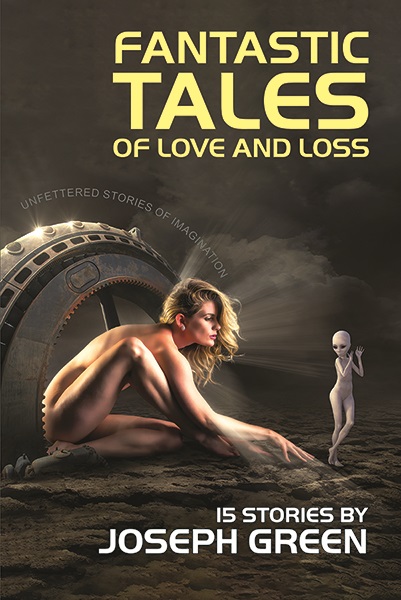 GREEN: Fantastic Tales of Love and Loss. It’s a theme anthology of stories dealing with romance, sex, and aliens, not necessarily in that order. In looking over my uncollected stories I saw I had enough dealing with those topics to make a book. How humans and aliens might interact in romantic and sexual ways has always been a topic of strong interest to SF writers and readers, and I was no exception. I also wanted to better preserve a lot of my work that had appeared only in magazines, so that was one selection criteria. If it was already out in hard cover, I skipped it (with a few exceptions I just had to include). I did that also for my other collections. The third and final one will be out next year.
GREEN: Fantastic Tales of Love and Loss. It’s a theme anthology of stories dealing with romance, sex, and aliens, not necessarily in that order. In looking over my uncollected stories I saw I had enough dealing with those topics to make a book. How humans and aliens might interact in romantic and sexual ways has always been a topic of strong interest to SF writers and readers, and I was no exception. I also wanted to better preserve a lot of my work that had appeared only in magazines, so that was one selection criteria. If it was already out in hard cover, I skipped it (with a few exceptions I just had to include). I did that also for my other collections. The third and final one will be out next year.
TANGENT: Thank you for bringing us up to date, Joe. And good luck with your new career as a full-time writer in the Indy world.
GREEN: Thank you.
(Left: The Mind Behind the Eye, 1971 – Center: Gold the Man, 1973 – Right: Conscience Interplanetary, 1974)
(Note: Gold the Man is a British edition of The Mind Behind the Eye.)
(Left: Star Probe, 1976 – Center: A Murder in the Real World, 2018 – Right: Three Sons of Bitter Sands, 2019)
♣ ♣ ♣
Joseph Green interview copyright © 2019 Dave Truesdale and Tangent Online.
All Rights Reserved.
